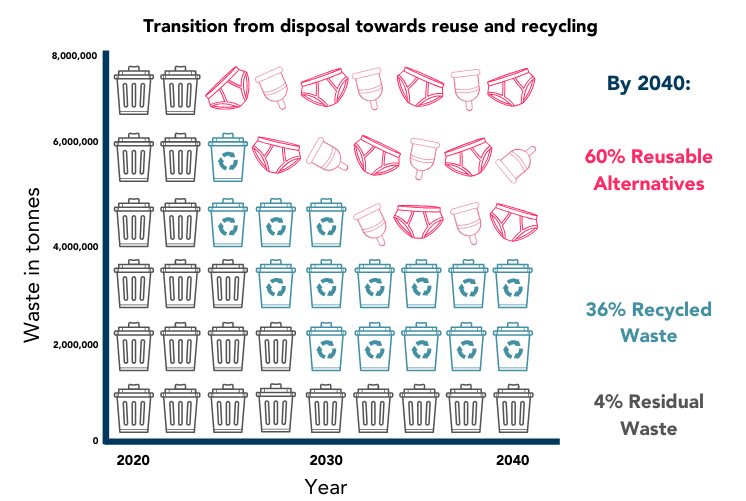
Disposable menstrual products, diapers, and wet wipes are causing serious environmental, economic and social impacts throughout their life cycle, from the production phase to their end of life. A ground-breaking study by Rezero on the environmental and economic impacts of disposable menstrual products, diapers, and wet wipes shows how the current generation of waste from these products represented approximately 7,832,000 tonnes within the EU-28 in 2017. Currently this waste is not separated for recycling, ending up in incineration facilities (13%), landfills (87%) or dumped into the environment.
The study also exposes the “hidden” costs associated with menstrual product waste, baby diapers and wet wipes. Estimates show that the costs for managing this waste (which cannot currently be recycled) is equivalent to between 500 and 1,000 million euros per year in the European Union. The costs borne by consumers are also highlighted: for example, when a person uses the menstrual cup instead of tampons or disposable pads, they can save between € 18 and € 119 a year, with a lifesaving of over 4,400 €.
The circular economy highlighted by the EU is only possible if reusable models and recycling are prioritized once the product can no longer be reused or used any more. In order to achieve a reduction of the waste that comes from these products and make the transition towards a circular economy, a study, also by Rezero, has proposed a set of specific actions and regulatory measures with the aim of minimizing the impact of menstrual products, diapers and wipes throughout Europe.
These measures are also highlighted in a policy brief where we ask the European Commission to adopt a strategy to increase the market for reusable menstrual products, diapers and wipes, while ensuring that single-use items are collected separately and recycle effectively. Some of the key recommendations included are setting a 30% reuse target by 2030, which should increase to 60% by 2040, along with selective collection for recycling of menstrual items, wet wipes, and disposable diapers by 40 % for the year 2025, 70% in 2030 and 90% in 2040.
Economic incentives, such as Extended Producer Responsibility programs, in conjunction with the application of environmental fees, should also be one of the backbones of this strategy, helping to finance the transition from single-use systems to reusable systems through the implementation, for example, of local washing plants for reusable diapers.
“Within the current EU legal framework, there is no specific regulation on waste management (collection, treatment and final disposal) of these products and there is no legal measure to support effective circular systems, such as reusable models and processes of cyclical recycling To achieve the objectives of the EU Circular Economy, a legal framework needs to be created for these products to ensure that only safe, circular and sustainable products are placed on the market, while allowing for efficient collection and recycling of single use ones” said Larissa Copello of Zero Waste Europe.
“For some time now, awareness on the negative consequences of the current model of production and consumption of disposable plastics has been increasing, but the high environmental and economic impacts of disposable menstrual products, diapers and wet wipes have never before been debated, beyond blaming consumers for their use. In the advance towards a Zero Waste society, the application of policies -from an environmental and gender perspective, is key to regulate these products and promote those that are reusable and free of toxins” says Alba Cabrera, Rezero’s head of studies.
Press Contact Anna Peña